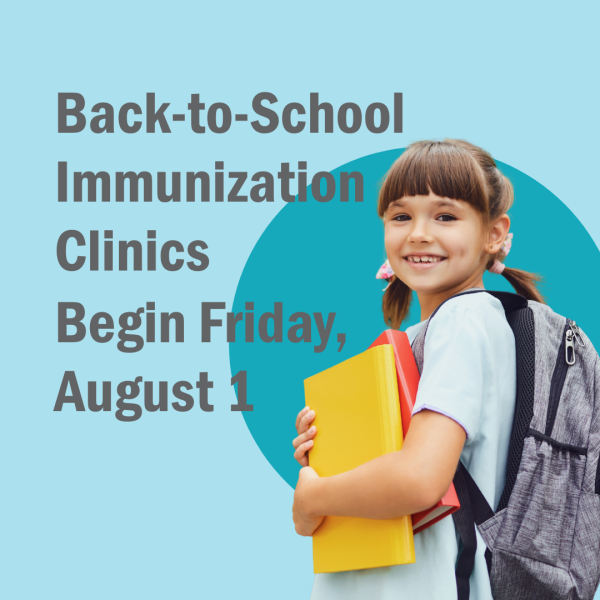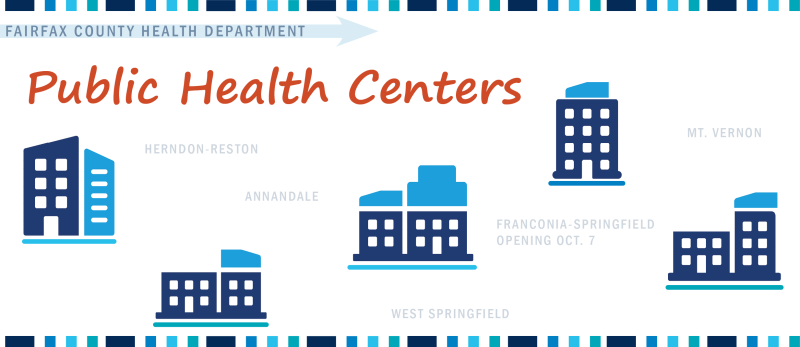Search the Health Department
Updates from the Health Department

August 11, 2025
Applications are now open for the Public Health Youth Ambassador Program's Fall 2025 cohort.
The Public Health Youth Ambassador Program (PHYAP) trains 10th through 12th grade high school students across Fairfax County about methods to reduce opioid use, teen mental health issues, and becoming a Community Health Worker. PHYAP provides certifications from two nationally-known public health institutions (Morehouse College and George Mason University) in each of those areas during its Fall and Spring cohorts.
Since PHYAP’s inception, the program is proud to have partnered with three outstanding Fairfax County Public Schools (FCPS), where our Community Health Worker curriculum is offered during day sessions: John R. Lewis High School, Justice High School, and Mount Vernon High School. Students who qualify can take part in lessons and hands-on activities led by trained PHYAP facilitators three days a week during their advisory period.
For high-school aged students who do not attend Lewis, Mount Vernon, or Justice but wish to become a Youth Ambassador, program sessions are offered outside of regular class hours at the Fairfax County Government Center. Evening classes are held Monday through Thursday each week, while our weekend class is held each Saturday morning. Whether a student attends private school, a faith-based school, is homeschooled, or goes to a non-partner Fairfax County Public School, they have the chance to jumpstart their secondary school and career engagement in the expanding community health field.
Justice High School graduate Nayla Bonilla Mendez recently shared her takeaways from the program. She said, “PHYAP helped to solidify my passion for public health, while giving me a unique perspective as a first-generation student navigating the education system. Through the program’s training, I learned about the importance of public health and its subcomponents, which allowed me to create a passion project addressing an issue that I felt was affecting my community." Today, Nayla is pursuing a public health degree at William and Mary University, and stays involved in the program, as a member of the PHYAP Alumni Program. "The PHYAP has provided me with lasting connections with colleagues in the professional world.” Nayla adds.
The application deadline for the Fall 2025 cohort is 5:00 p.m. on Thursday, August 28th.
Follow the link to learn more about the Public Health Youth Ambassador Program, including how to submit an application.

July 31, 2025
The Fairfax County Health Department’s back-to-school immunization clinics begin Friday, August 1 from 1-4 pm at the Joseph Willard Health Center and Mount Vernon District Office clinics. Appointments are encouraged but walk-ins are also welcome. See all back-to-school clinic dates, times, and locations in the table below.
Dates and Times
Locations
Friday, August 1, 2025
1-4:00 pm
Joseph Willard Health Center, Mount Vernon District Office
Saturday, August 2, 2025
8 am-12:00 pm
Annandale District Office, Joseph Willard Health Center
Tuesday, August 5, 2025
2-6:30 pm
Annandale District Office, Herndon-Reston District Office, Joseph Willard Health Center, Mount Vernon District Office, Springfield District Office
Friday, August 8, 2025
1-4:00 pm
Annandale District Office, Herndon-Reston District Office
Saturday, August 9, 2025
8 am-12:00 pm
Herndon-Reston District Office, Mount Vernon District Office
Monday, August 11, 2025
2-6:30 pm
Annandale District Office, Herndon-Reston District Office HRDO, Joseph Willard Health Center, Mount Vernon District Office, Springfield District Office
Tuesday, August 12, 2025
2-6:30 pm
Annandale District Office, Herndon-Reston District Office HRDO, Joseph Willard Health Center, Mount Vernon District Office, Springfield District Office
Wednesday, August 13, 2025
2-6:30 pm
Annandale District Office, Herndon-Reston District Office HRDO, Joseph Willard Health Center, Mount Vernon District Office, Springfield District Office
Friday, August 15, 2025
1-4:00 pm
Annandale District Office, Herndon-Reston District Office HRDO, Joseph Willard Health Center, Mount Vernon District Office, Springfield District Office
Saturday, August 16, 2025
8 am-12:00 pm
Springfield District Office
Tuesday, August 19, 2025
2-6:30 pm
Annandale District Office, Herndon-Reston District Office HRDO, Joseph Willard Health Center, Mount Vernon District Office, Springfield District Office
Friday, August 22, 2025
1-4:00 pm
Annandale District Office, Herndon-Reston District Office HRDO, Joseph Willard Health Center, Mount Vernon District Office, Springfield District Office
These clinics are open to all Fairfax County students who need immunizations, regardless of if they have had vaccines in the past, are new to the country, or need a follow-up to be up to date. The Fairfax County Health Department also offers childhood immunizations by appointment during regular clinic hours and during limited walk-in times. Get more information.
Additional School Immunization Options
Visit your pediatrician or family physician. Many providers require an appointment, don't delay, schedule it today.
Inova Cares Back to School Pediatric Health Fairs provide children ages 5 and up with free school physicals and immunizations. Weekday and weekend clinics are available in July and August. These health fairs are for VA Medicaid or Uninsured Inova registered patients only. Appointments are required. Call 703-698-2550 to make an appointment. Bring vaccine records to the appointment.
Immunizations are the most effective way to protect your child from serious illness and prevent them from missing school and other activities because they are sick. By ensuring your child is vaccinated, you not only protect them but also stop the spread of illness in schools and communities.
Parents of students entering kindergarten, 7th grade, and 12th grade should be aware of the Virginia immunization requirements.
Learn more about childhood and school required immunizations.

July 29, 2025
Starting this October, the Fairfax County Health Department District Office locations will be named “Public Health Centers.” The name change coincides with the Franconia-Springfield Public Health Center opening on October 7, 2025. Once this new location opens, the other Health Department locations will be known as follows:
Annandale Public Health Center (APHC)
Herndon-Reston Public Health Center (HRPHC)
Mt. Vernon Public Health Center (MVPHC)
West Springfield Public Health Center (WSPHC formerly “Springfield District Office”)
The former term “District Office” has occasionally caused confusion for residents mistakenly going to a Board of Supervisors district office instead of a Health Department location.
Renaming these locations “Public Health Centers” also helps clarify their function. The updated names better reflect the full range of services available at these centers, which include immunizations, STI and HIV testing, Tuberculosis screening, WIC, and vital records, and further conveys their purpose as a location for community residents and stakeholders to receive other public health information. For more information about Fairfax County Health Department services, visit: www.fairfaxcounty.gov/health/clinics.
The Health Department is reminding residents that the Joseph Willard Health Center located in the City of Fairfax will temporarily close October 1, 2025. Learn more: www.fairfaxcounty.gov/health/joseph-willard-health-center-closing-during-construction-project

July 25, 2025
As temperatures rise, so do the risks for heat-related illnesses like heat exhaustion and heat stroke. Older adults, young children, outdoor workers, and people with chronic health conditions are especially at risk, but extreme heat can affect anyone. Knowing how to prepare, spot the warning signs, and take action can help you stay safe.
Understanding Heat Alerts
Fairfax County activates its heat response plan when the National Weather Service (NWS) issues a heat advisory, watch, or warning — usually about 24 hours in advance. These alerts are based on the heat index, which combines temperature and humidity to reflect how hot it actually feels outside.
Heat Advisory: Dangerous heat is expected. Take precautions to stay cool and hydrated.
Extreme Heat Watch: Hazardous heat is possible. Reschedule outdoor activities, and make sure children, older adults, pets, and service animals have access to cool shelter.
Extreme Heat Warning: Dangerous heat is happening or about to happen. Avoid strenuous activity and direct sunlight. Stay indoors, if possible, drink plenty of fluids, and check on loved ones, pets, and service animals.
Heat-Related Illnesses: What to Watch For
Heat-related illnesses can come on quickly, so it’s important to know the signs and what to do.
Heat Exhaustion:
Symptoms: Heavy sweating, weakness, dizziness, nausea, cool or clammy skin, headache, muscle cramps.
What to Do: Move to a cooler spot (ideally indoors with air conditioning); apply cool, wet cloths to your body or take a cool bath; and sip water. Seek medical help if symptoms worsen, last more than an hour, or include vomiting.
Heat Stroke:
Symptoms: Confusion, slurred speech, body temp above 103°F, red or dry skin, rapid pulse, fainting.
What to Do: Call 911 immediately. This is a medical emergency. Move the person to a cooler place, use cool cloths or a cold bath to lower body temperature, and avoid giving fluids unless told otherwise by a medical professional.
Dehydration:
Symptoms: Dry mouth, fatigue, dizziness, dark-colored urine, muscle cramps.
What to Do: Sip water or electrolyte drinks to rehydrate. Avoid or limit caffeine and alcohol consumption, as these can be dehydrating.
Heat Rash:
Symptoms: Clusters of red blisters in sweaty areas.
What to Do: Keep the area cool and dry. Avoid heavy creams or ointments that can trap heat.
Heat Cramps:
Symptoms: Painful muscle cramps in the legs or abdomen, heavy sweating.
What to Do: Rest, sip water (unless you feel nauseated), and gently stretch or massage cramped muscles. If cramps last more than an hour, seek medical attention.
Sunburns:
Symptoms: Red, painful skin that feels hot to the touch.
What to Do: Use sunscreen SPF 30+ to prevent sunburn, reapply often, and stay out of direct sunlight. For burns, take cool baths, apply aloe vera, and stay hydrated. Seek medical care if blisters or fever occur.
Take Steps to Stay Safe in the Heat
When summer temperatures are high, you can protect yourself by following these Do’s and Don’ts:
Do:
Drink water regularly. Don’t wait until you’re thirsty!
Wear loose, light-color clothing and a wide-brimmed hat.
Stay indoors during the hottest part of the day, about 10 a.m. to 4 p.m.
Use sunscreen with an SPF rating of 30+ and reapply often.
Identify air-conditioned places you can go to stay cool.
Don’t:
Leave people or animals in parked cars.
Rely solely on a fan.
Exercise or do other strenuous activity outdoors during extremely high temperatures.
Drink alcohol or sugary drinks.
Fairfax County and its partners offer several programs to help you and your loved ones beat the heat:
Senior Cool Care Program: The Senior Cool Care Program is a program that helps low-income older residents in our jurisdiction keep cool during summer months. This program does not provide financial assistance, but it provides additional cooling at home by providing fans for eligible older adults, age 60 and older.
Cooling Assistance Program: The Cooling Assistance program helps keep Fairfax County residents cool during the summer months through financial assistance for paying electric bills, repairing central air conditioning systems, purchasing a whole-house fan, and more. To be eligible, at least one household member must be: 60 or older; 5 or younger; or disabled according to Social Security, Medicaid or 100% Veteran’s Administration.
Cooling Centers: Visit indoor air-conditioned locations during operating hours to stay cool. In addition to shopping malls, stores or movie theaters, you may consider cooling off at one of our county facilities designated as Cooling Centers, including libraries, community centers, REC centers, Human Services regional offices, and homeless shelters. Check that locations are open before you arrive.
Public Pools: The county operates several pools, which are open to the public.
Considerations for Medical Conditions
High heat can worsen existing medical conditions like heart disease and respiratory illness. Some medications, such as antidepressants, antipsychotics, and certain heart medicines, can make it harder for your body to cool down. Other medications, such as insulin, can be damaged by heat and lose their effectiveness. Diuretics can have a dehydrating effect. Talk to your healthcare provider about how heat may affect your condition and medicine.
As you sweat, you can lose important salt and minerals from your body. Talk with your doctor about how you can safely restore lost salt and minerals from heavy sweating.
Caretakers of individuals with chronic conditions should monitor whether the individual is drinking enough water, showing signs of heat stress, knows how to keep cool, and knows where and how to access air conditioning.
High heat also comes with other health considerations:
Mental Health: High temperatures can increase stress, anxiety, irritability, and other negative feelings. Check in with your loved ones and neighbors. The county’s Community Services Board offers mental health services. Check out resources.
Animals (including Service Animals): If temperatures are unsafe for you, then temperatures are unsafe for pets and service animals. Never leave pets in cars or on hot pavement. To report a pet in a hot vehicle, you can call Animal Protection Police at 703-691-2131. Make sure that they have constant access to fresh water and bring service animals and pets indoors during extreme heat. Certain animals such as short-nosed dogs and cats, senior animals, and those with heart or lung conditions are more affected by heat. Look out for symptoms of overheating, such as excessive panting, difficulty breathing, increased heart rate, or weakness. Learn more emergency preparedness tips for animals.
Outdoor Workers: Wear breathable gear and take frequent breaks, as possible. Limit heat exposure by taking frequent breaks in cool or shaded areas, trying to work in the shade, and staying hydrated by drinking lots of water.
To learn more about extreme heat and available county resources, visit the Department of Emergency Management and Security’s extreme heat webpage.
Wash Your Hands Often
![]()
Mosquito & Tick Bite Prevention
![]()
Health Dept. Strategic Plan
![]()
Parents: Get your child's immunizations up-to-date!
 Ensuring children are up-to-date on their vaccinations helps provide immunity before they are exposed to potentially life-threatening diseases.
Ensuring children are up-to-date on their vaccinations helps provide immunity before they are exposed to potentially life-threatening diseases.
And remember, vaccination it important at all ages. Parents, grandparents, and caregivers, make sure you are up to date, too!
Opioid Resources
Featured Video: Maternal Mental Health Awareness
Stay Connected with Public Health
Connect with us!
Make Health Happen: Join Our Team
Working in public health provides opportunities to make a difference in your community. Learn more about full-time, part-time, and internship positions.
About the Health & Human Services System
This agency is a part of the Fairfax County Health & Human Services System (HHS). The HHS System is a network of county agencies and community partners that support the well-being of all who live, work and play in Fairfax County.

